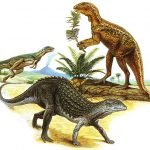Asteroid that formed Vredefort crater much bigger than previously thought
About two billion years ago, an impactor hurtled toward Earth, crashing into the planet in an area near present-day Johannesburg, South Africa.
The impactor—most likely...
NASA’s DART mission hits asteroid in first-ever planetary defense test
After 10 months flying in space, NASA’s Double Asteroid Redirection Test (DART) – the world’s first planetary defense technology demonstration – successfully impacted its...
How did ‘bird-hipped’ dinosaurs evolve?
Researchers have conducted a new analysis of the origins of ‘bird-hipped’ dinosaurs – the group which includes iconic species such as Triceratops.
They found that...
Is war in Ukraine at turning point?
At least for now the tide appears to be turning against Russia in its attack on Ukraine, which has recaptured wide swaths of land...
Life on earth might really have started with clay
In mythologies and origin stories around the world, various cultures and religions point to clay as the vessel of life, the primordial material that...
Where you live could increase your longevity
In a study from Syracuse University, scientists found Americans who live in so-called blue states tend to live longer than those in red states,...
Scientists discover extinct prehistoric reptile that lived among dinosaurs
Scientists have discovered a new extinct species of lizard-like reptile that belongs to the same ancient lineage as New Zealand’s living tuatara.
They describe the...
Scientists find new way to detect baby planets in the making
Astronomers agree that planets are born in protoplanetary disks — rings of dust and gas that surround young, newborn stars.
While hundreds of these disks...
Scientists discover the earliest gibbon fossil in southwest China
Scientists have discovered the earliest gibbon fossil, a find that helps fill a long-elusive evolutionary gap in the history of apes.
The work, reported in...
North Atlantic reached a tipping point, shows Ice Age study
Scientists have used centuries-old clam shells to see how the North Atlantic climate system reached a "tipping point" before the Little Ice Age.
The Little...










